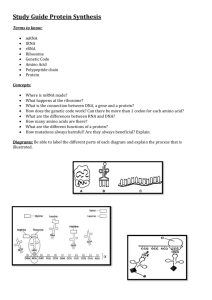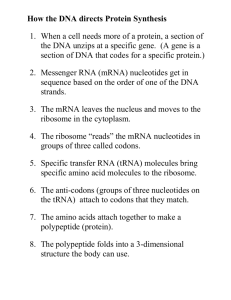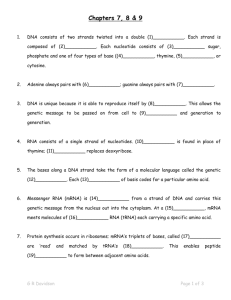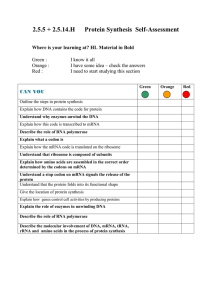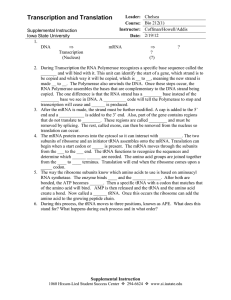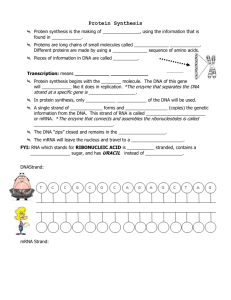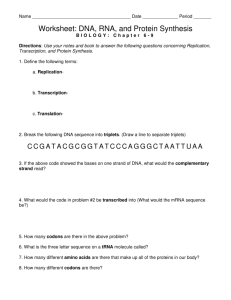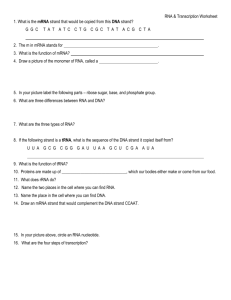DNA, RNA, and Protein
advertisement
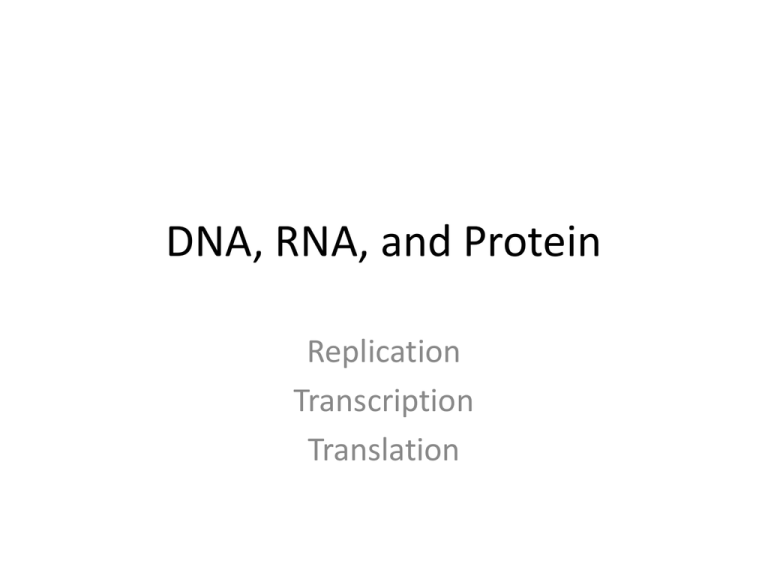
DNA, RNA, and Protein Replication Transcription Translation Replication • Occurs during S phase of cell cycle • DNA unwinds, in increments, via helicase • DNA polymerase makes 2 copies of DNA – Complementary base pairing: G=C; T=A – Leading strand has continuous replication – Lagging strand done in Okazaki fragments • Ligase joins segments on lagging strand Making copies of DNA • 5’TACCGACTTGATCATTTAGGTAGACATATT …3’ 3’ATGGCTGAACTAGTAAATCCATCTGTATAA …5’ DNA splits into leading (5’) & lagging (3’) strands Each strand does complementary base pairing. • 5’TACCGACTTGATCATTTAGGTAGACATATT …3’ 3’ATGGCTGAACTAGTAAATCCATCTGTATAA …5’ and • 3’ATGGCTGAACTAGTAAATCCATCTGTATAA…5’ 5’TACCGACTTGATCATTTAGGTAGACATATT …3’ Transcription • Makes RNA copy of DNA via RNA polymerase • Makes mRNA, tRNA, or rRNA • RNA polymerase binds to DNA promoter • DNA strands unwind & separate • RNA polymerase adds free RNA nucleotides to complement 1 strand of DNA bases. • G =C; C=G; T=A; A=U • RNA polymerase releases DNA & new RNA when reaches a termination signal. Transcription & Translation DNA:5’TACCGACTTGATCATTTAGGTAGACAT…3’ mRNA:AUGGCUGAACUAGUAAAUCCAUCUGUA… • mRNA exits nucleus after processing cap & tail • mRNA on ribosome is translated via tRNAs. • tRNA anticodons pair with mRNA codons (UAA, UAG, UGA). • Each tRNA carries a specific amino acid or a stop signal. • Genetic code is maintained universally. mRNA: AUGGCUGAACUAGUAAAUCCAUCUGUA polypeptide: met-ala-glt-leu-val-ast-pro-ser-val- Translation • • • • Involves all 3 types of RNA: mRNA, tRNA, rRNA Produces polypeptides which form proteins Peptide bonds link amino acids together There are 20 essential amino acids found in all living things. Some have modifications. o o o • Amino acids form 1 , 2 & 3 protein structures – Structures are essential to protein function Steps of Translation • • • • • • • • • mRNA docks on ribosome. Its 1st codon is AUG tRNA with met binds via its anticodon UAC. tRNA with its amino binds to 2nd codon. Ribosome detaches met from 1st tRNA. Peptide bond forms between met & 2nd amino acid. First tRNA exits the ribosome & 3rd tRNA enters. Elongation continues until reaches stop codon Ribosome separates from mRNA with last tRNA Translation machinery then translates same or new mRNA Human Genome • The entire gene sequence of human DNA • 3.2 billion base pairs in our 23 chromosomes • Use computers to analyze DNA sequences – Bioinformatics , a new field, compares these. • Help predict loci of genes • Don’t know yet what all 30,000 genes encode • Field of proteomics links gene to protein made
